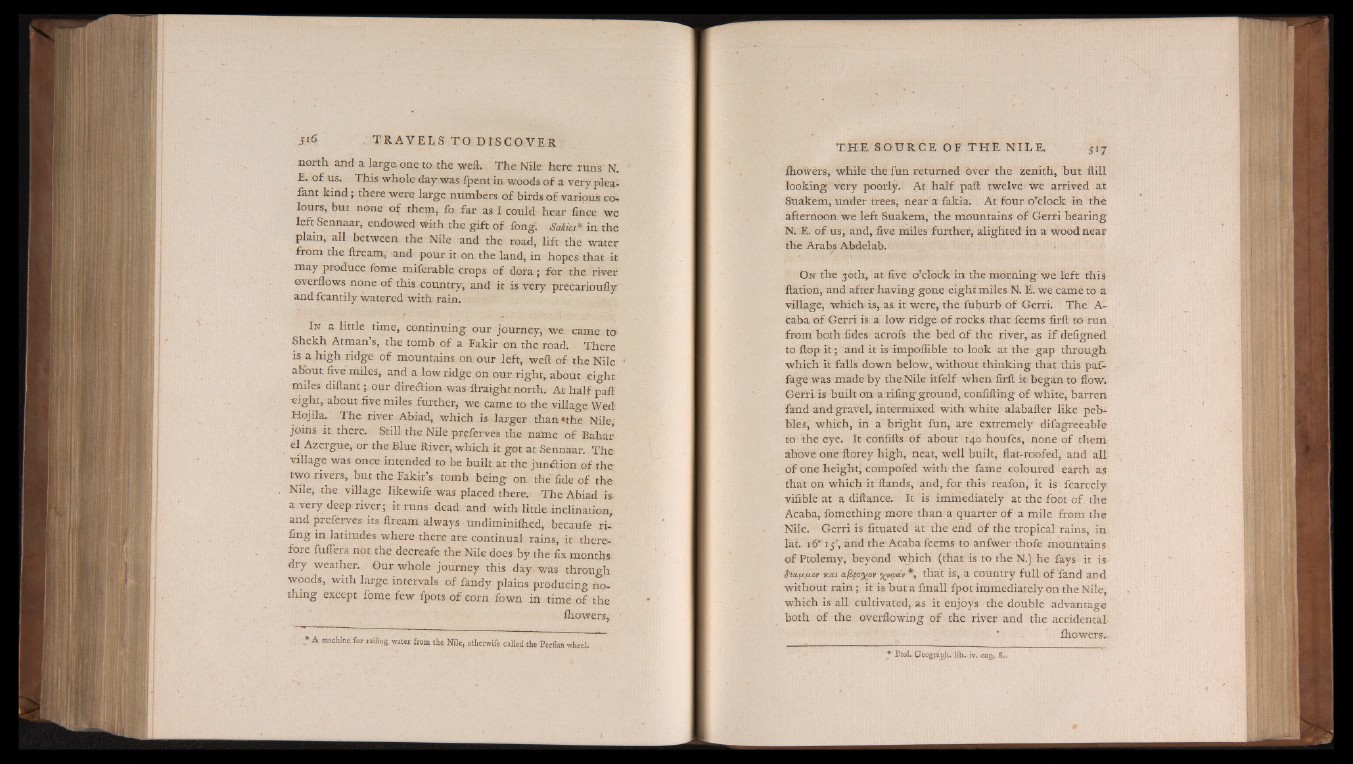
north and a large one to the weft. The Nile here runs N.
E. o f us. This whole day was fpent in woods o f a very plea-
fant k in d ; there were large numbers o f birds o f varipus colours,
but none o f them, fo far as I could hear fince we
left Sennaar, endowed with the g ift o f fong. SaMei* in the
plain, all between the Nile and the road, lift the water
from the ftream. and pour it on the land, in hopes that it
may produce fome miferable crops o f d o ra ; for the river
overflows none o f this country, and it is very precarioufly
and fcantily watered with rain.
I n a little time, continuing our journey, we came to
Shekh Atman’s, the tomb o f a Fakir on the road. There
is a high ridge o f mountains on our left, weft o f the Nile
about five miles, and a low ridge on our right, about eight
miles diftant; our direction was ftraight north. At h a lf paft
e ight, about five m iles further, we came to the village Wed
Hojila. The river Abiad, which is larger than *the Nile,
joins i t there. Still the Nile preferves the name o f Babar
el Azergue, or the Blue River, which it got at Sennaar. The
village was once intended to be built at the jun&ion o f the
two rivers, but the Fakir’s tomb being on the“ fide o f the
Nile, the village likewife was placed there.- The Abiad is-
a very deep river; it runs dead and with little inclination,,
and preferves its ftream always undiminifhed, becaufe riling
in latitudes where there are continual rains, it therefore
fuffers not the decreafe the Nile does by the fix months
dry weather. Our whole journey this day was through
woods, with large intervals o f fandy plains producing nothing
except fome few fpots o f corn fown in time o f the
fhowers,:
* A machine for. raffing, water from the Nile, otherwife called the Eerfian wheel.
fhowers, while the fun returned bver the zenith, but ftill
looking very poorly. At h a lf paft twelve we arrived at
Suakem, under trees, near a fakia. At four o’clock in the
afternoon we left Suakem, the mountains o f Gerri bearing
N* £. o f us, and, five miles further, alighted in a wood near
the Arabs Abdelab.
On the 30th, at five o’clock in the morning we left this
ftation, and after h aving gone eight miles N. E. we came to a
village, which is, as it were, the fuburb o f Gerri. The A -
caba o f Gerri is a low ridge o f rocks that feems firft to run
from both fides acrofs the bed o f the river, as if'defigned
to flop i t ; and it is impoflible to look at the gap through,
which it falls down below, without thinking that this paf-
fage was made b y the Nile itfelf when firft k began to flow.
Gerri is built on a riling ground, confuting o f white, barren
fand and gravel, intermixed with white alabafter like pebbles,
which, in a bright fun, are extremely difagreeable
to the eye. It confifts o f about 140 houfes, none o f them
above one ftorey high, neat, well built, flat-roofed, and all
o f one height, compofed with the fame coloured earth as
that on which it ftands, and, for this reafon, it is fearcely
vifible at a diftance.. It is immediately at the foot of. the
Acaba, fomething more than a quarter o f a mile from the
Nile. Gerri is fituated at the end o f the tropical rains, in
lat. 16° 15', and the Acaba feems to anfwer thofe mountains
o f Ptolemy, beyond wl>ich (that is to the N.) he fays it is-
'lixrj.u-.cv tccct ct&po'ypy yopa.\ *, that is, a country fu ll of fand and
without ra in ; it is but a fmall fpot immediately on the Nile,
which is all cultivated, as it enjoys the double advantage
both o f the overflowing o f the river and the accidental
fhowers..